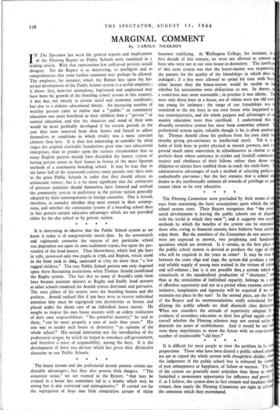It is interesting to observe that the Public School system
as we know it today is of complratively recent date. In the seventeenth and eighteenth centuries the success of any particular school was dependent not upon its own traditional repute, but upon the per- sonality of the head master. Thus Shrewsbury, which had 360 boys in 1581, possessed only two pupils in 1798, and Repton, which stood in the front rank in 1664, contained in 1705 no more then "a few ragged children." The true Public School pattern was only imposed upon these fluctuating institutions when Thomas Arnold established the Rugby system. The fact that so many of Arnold's sixth form boys became assistant masters at Rugby and finally head masters at other schools rendered the Arnold system dominant and pervasive. The twin pillars of his system were the boarding houses and the prefects. Arnold realised that if 500 boys were to receive individual attention they must be segregated into dormitories or houses and placed under the direct care of an individual house master. He sought to inspire his own house masters with an ardent realisation of their own responsibilities: "No parochial ministry," he said to them, "can be more properly a cure of souls than yours." His aim was to render each house or dormitory "an epitome of the whole school." His second innovation was the introduction of the prefectorial system, by which he hoped to introduce self-government, and therefore a sense of responsibility, among the boys. It is the development of these two devices which has given their distinctive character to our Public Schools.


























 Previous page
Previous page